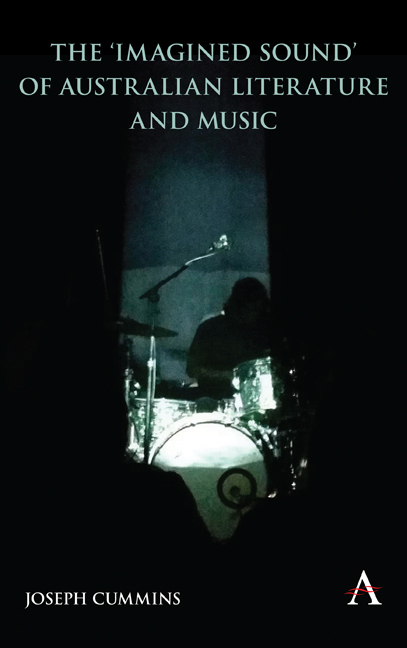Book contents
- Frontmatter
- Contents
- Foreword
- Acknowledgements
- Introduction: Imagined Sound
- Part One Listening to the Continent
- Part Two Listening to Islands and Archipelagos
- 4 An Archipelago of Convicts and Outsiders: The Songs of the Drones and Gareth Liddiard
- 5 Echoes between Van Diemen's Land and Tasmania: The Space of the Island in Richard Flanagan's Death of a River Guide and Carmel Bird's Cape Grimm
- 6 A Sonic Passage between Islands: Mutiny Music by Baecastuff
- Part Three Listening to the Continental Archipelago
- Coda
- Notes
- Works Cited
- Index
4 - An Archipelago of Convicts and Outsiders: The Songs of the Drones and Gareth Liddiard
from Part Two - Listening to Islands and Archipelagos
Published online by Cambridge University Press: 18 September 2019
- Frontmatter
- Contents
- Foreword
- Acknowledgements
- Introduction: Imagined Sound
- Part One Listening to the Continent
- Part Two Listening to Islands and Archipelagos
- 4 An Archipelago of Convicts and Outsiders: The Songs of the Drones and Gareth Liddiard
- 5 Echoes between Van Diemen's Land and Tasmania: The Space of the Island in Richard Flanagan's Death of a River Guide and Carmel Bird's Cape Grimm
- 6 A Sonic Passage between Islands: Mutiny Music by Baecastuff
- Part Three Listening to the Continental Archipelago
- Coda
- Notes
- Works Cited
- Index
Summary
Listening to three contemporary folk songs – ‘Words From the Executioner to Alexander Pearce’ and ‘Sixteen Straws’ by the Drones and ‘The Radicalisation of D’ by Gareth Liddiard – remaps the space of the Australian convict myth. Defined by abjection and the transmission of affect conveyed through lyrics and live performance, listening to these songs, listening to the imagined sound of this abjection, we can hear the formation of an archipelago linking the Australian continent and its ‘islands’ of incarceration – Tasmania or Van Dieman's Land, Norfolk Island and Moreton Bay – to a global and transhistorical network of places such as the British Isles, Guantanamo Bay and Manhattan Island. The songs form a cartography that expands the scope of the convict myth beyond the confines of the Australian continent, locating it within a global carceral archipelago. At the same time, the abject character of the experience of convicts (in the colonial period) or outsiders (in a contemporary timeframe) is at the core of the appeal of the Drones and Liddiard to contemporary audiences, a fact I witnessed first-hand at a performance by the Drones.
In October 2011, I saw the Drones play at the Metro Theatre in Sydney. I first encountered the band through their song ‘Shark Fin Blues’, voted the ‘Greatest Aussie Song of All Time’ by a panel of contemporary songwriters in J Mag, the publication of influential youth radio station Triple J. The song outpolled classics of Australian popular music, such as ‘(I'm) Stranded’ by the Saints, and ‘Friday on My Mind’ by the Easy Beats. Over the past fifteen years, the Drones and their leader and principle songwriter Liddiard have produced some of the most compelling, challenging and artistically admired rock music on the Australian music scene. Liddiard's solo album Strange Tourist (2010) is described by Triple J's Dom Alessio as ‘quintessentially Australian’, like ‘the soundtrack to a Banjo Paterson poem, a Frederick McCubbin painting and a Ned Kelly biopic […] you can't help but imagine postcard-style images of the outback, like an ochre-stained Nullabor or a rustic desert cottage’ (Alessio, n.p.).
As is customary for a rock concert, at the Metro the Drones performed for close to an hour and a half, with an encore of several songs.
- Type
- Chapter
- Information
- The 'Imagined Sound' of Australian Literature and Music , pp. 85 - 98Publisher: Anthem PressPrint publication year: 2019



